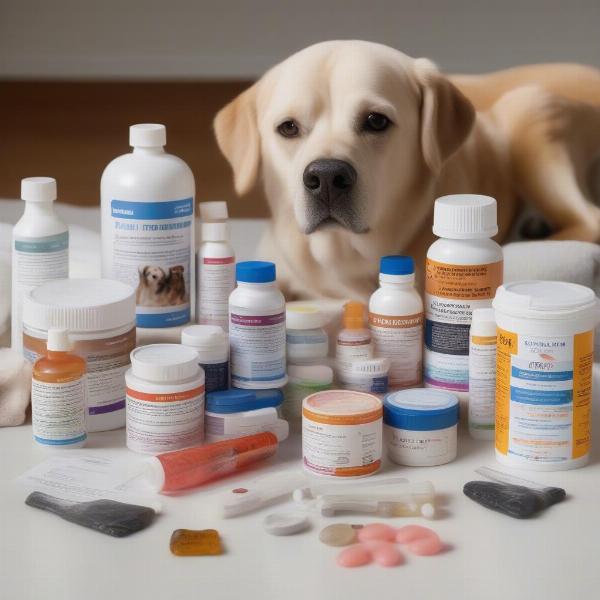Frontline for dogs worming is a common search term, indicating pet owners are looking for information about parasite prevention. While Frontline is primarily known for flea and tick control, this article will clarify its role in worming, discuss effective worming medications, and provide a comprehensive guide to protecting your canine companion from internal parasites.
Understanding the Importance of Dog Worming
Intestinal worms are a serious health concern for dogs of all ages and breeds. These parasites can cause a range of problems, from mild discomfort to life-threatening conditions. Regular worming is essential to prevent infestations and protect your dog’s health. Common signs of worms in dogs include vomiting, diarrhea, weight loss, a pot-bellied appearance, and scooting. If you notice any of these signs, consult your veterinarian immediately. Early detection and treatment are crucial for preventing serious complications.
Frontline and Worming: Setting the Record Straight
Frontline is a popular brand of flea and tick preventative, but it does not treat or prevent worms. It’s important to understand this distinction to ensure your dog receives the appropriate parasite protection. While Frontline effectively targets external parasites like fleas and ticks, a separate worming medication is required to address internal parasites like roundworms, hookworms, tapeworms, and whipworms.
Choosing the Right Wormer for Your Dog
Several effective worming medications are available for dogs, each targeting specific types of worms. Some common options include:
- Praziquantel: Effective against tapeworms.
- Pyrantel pamoate: Effective against roundworms and hookworms.
- Fenbendazole: Effective against roundworms, hookworms, whipworms, and some types of tapeworms.
- Milbemycin oxime: Effective against heartworms, roundworms, hookworms, whipworms, and some types of tapeworms.
Your veterinarian can recommend the most appropriate wormer for your dog based on their age, breed, lifestyle, and risk factors.
 Different Types of Dog Wormers
Different Types of Dog Wormers
Establishing a Worming Schedule
Puppies require more frequent worming than adult dogs due to their immature immune systems and higher risk of exposure. Generally, puppies should be wormed every 2-3 weeks until they are 12 weeks old, then monthly until they are six months old. Adult dogs should typically be wormed every three months, but your veterinarian may recommend a different schedule based on your dog’s individual needs and risk factors.
Preventing Worm Infestations
While regular worming is essential, preventative measures can also help reduce your dog’s risk of worm infestation. These include:
- Proper hygiene: Regularly clean your dog’s living area and dispose of their feces promptly.
- Flea and tick control: Fleas can transmit tapeworms, so effective flea control is crucial.
- Avoiding contact with wildlife: Wildlife can carry various parasites, so discourage your dog from interacting with them.
- Preventing scavenging: Don’t allow your dog to scavenge or eat feces, as this can transmit worms.
Conclusion
While Frontline is a valuable tool for flea and tick control, it does not protect against worms. Regular worming with an appropriate medication is essential to safeguard your dog’s health. Consult your veterinarian to determine the best worming protocol for your canine companion. By understanding the importance of worming and taking preventative measures, you can ensure your dog lives a long, healthy, and parasite-free life.
FAQ
- Does Frontline prevent worms? No, Frontline is designed for flea and tick control, not worm prevention.
- How often should I worm my dog? Adult dogs typically require worming every three months, but consult your veterinarian for specific recommendations.
- What are the signs of worms in dogs? Common signs include vomiting, diarrhea, weight loss, a pot-bellied appearance, and scooting.
- What types of worms can infect dogs? Common types include roundworms, hookworms, tapeworms, and whipworms.
- How can I prevent worm infestations in my dog? Preventative measures include regular worming, flea control, proper hygiene, and preventing scavenging.
- Can I buy worming medication over the counter? Yes, some worming medications are available over the counter, but it’s always best to consult your veterinarian for appropriate recommendations.
- What should I do if I think my dog has worms? Contact your veterinarian immediately for diagnosis and treatment.
About ILM Dog
ILM Dog is your trusted source for expert advice on all aspects of dog care and well-being. We offer comprehensive information on dog breeds, health, training, nutrition, grooming, and much more. From choosing the right breed to providing the best healthcare, ILM Dog is here to support you every step of the way. Contact us at [email protected] or +44 20-3965-8624 for personalized advice.